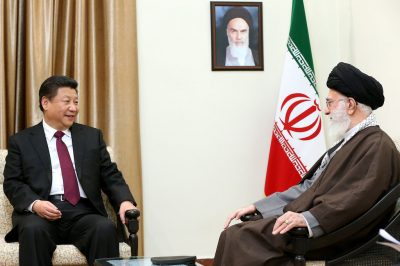Iran Becomes Full Member of the Shanghai Cooperation Organization (SCO). Geopolitical and Economic Implications
Interview with PressTV

All Global Research articles can be read in 51 languages by activating the “Translate Website” drop down menu on the top banner of our home page (Desktop version).
Visit and follow us on Instagram at @crg_globalresearch.
***
On 17 September 2021 Iran has become a full member of the Shanghai Cooperation Organization (SCO). It is an extraordinary achievement and new beginning for US and western sanction-badgered Iran. Transcript of Press TV interview with Peter Koenig.
PressTV: Iran is finally a member of the SCO. It is said that this solidifies a block to stand up to the West and US hegemony: will it be able to do that, and is the era of unilateralism over?
Peter Koenig: First, my deepest and heartfelt congratulations for this extraordinary event – Iran the latest member of the Shanghai Cooperation Organization – SCO. Bravo!
Yes, this will definitely open new doors, prosperous doors with new relations in the East. SCO with the current membership covers close to 50% of the world population and accounts for about one third of the world’s GDP.
Being a member of this organization, will take a lot of pressure away in terms of western sanctions, western impositions, monetary manipulations via the US dollar as a remedy for payment.
No more.
Iran is now free to deal in her own currency and in Yuan as well as in any currency of the SCO members, because western-type trade currency restrictions do not exist in SCO member countries.
This will drastically reduce the potential for US / western sanctions and will increase on the other hand, Iran’s potential to deal with the East, i.e., especially China and Russia; entering partnership agreements with these and other SCO countries, benefitting from comparative advantages. It may open-up a new socio-economic era for Iran.
Also, in terms of defense strategy – although SCO is not a military defense organization per se, but it offers strategic defense assistance and advice – and as such is a solidifying force for member countries.
SCO also respects countries’ autonomy and sovereignty – and facilitates trade arrangements between member countries.
Having said this, Iran must not lose sight of potentially disrupting internal factors, like the so-called Fifth Columnists – those who will keep pulling towards the west, and they are particularly dangerous as infiltrates in the financial sector, Treasury, Ministry of Finance, Central Bank, and so on. They are everywhere, also in Russia and China. But internal Iranian awareness and caution will help manage the risks and eventually overwhelm it. Russia has gone along way in doing so. And so has China. And so will Iran. I’m confident.
Again, excellent momentum to celebrate. Congratulations!
PressTV: Iran will also be part of the different regional bodies in neighborhood regions, including Eurasia, that could spontaneously break the “sanctions wall” and lead to diversified fruitful foreign relations. Does this mean the US sanctions will not be as effective?
PK: Yes, absolutely. Regional bodies and trading arrangements within Eurasia – such as the Eurasian Economic Union – has an integrated single market of 180 million people and a GDP of some 5 trillion dollars equivalent and growing. It covers eight countries of which 3 have observer status.
Other than trading with the members of the Eurasian Economic Union, the EAEU also has trading agreements as an entity with other countries, for example with Singapore.
Then there is maybe the most important trade deal in world history, the ten ASEAN countries, plus China, as well as Japan, South Korea, Australia and New Zealand but not the United States. Thus, no dealings in US dollars, no potential for US sanctions. This Trade Agreement is called The Regional Comprehensive Economic Partnership (RCEP). It was signed in November 2020 on the occasion of the annual summit of the 10-nation Association of Southeast Asian Nations (ASEAN).
RCEP countries have a combined GDP of US$ 26.2 trillion or about 30% of global GDP, and they account for nearly 28% of global trade (based on 2019 figures). Total population of RCEP countries is 2.3 billion, roughly 30% of the world’s inhabitants.
Negotiation of this trade deal took 8 years. The longest ever. And it will of course, take time to reach the full potential of integrating the sovereign countries economies. In contrast to the European Union, RCEP will to the utmost possible preserve each country’s sovereignty. This is important in the long-run, especially for conservation of national cultures, ideologies and national development strategies.
There maybe a good chance for Iran to negotiate early entry into the RCEP Agreement. It will definitely be a blow to US sanctions and on the other hand a tremendous opportunity for diversification of markets, production and consumption.
Again, congratulations. Being a member of the SCO is an extraordinary achievement. As, I always say the future is in the East. Best of luck to Iran, with new partners and new friends.
*
Note to readers: Please click the share buttons above or below. Follow us on Instagram, @crg_globalresearch. Forward this article to your email lists. Crosspost on your blog site, internet forums. etc.
Peter Koenig is a geopolitical analyst and a former Senior Economist at the World Bank and the World Health Organization (WHO), where he has worked for over 30 years on water and environment around the world. He lectures at universities in the US, Europe and South America. He writes regularly for online journals and is the author of Implosion – An Economic Thriller about War, Environmental Destruction and Corporate Greed; and co-author of Cynthia McKinney’s book “When China Sneezes: From the Coronavirus Lockdown to the Global Politico-Economic Crisis” (Clarity Press – November 1, 2020)
Peter Koenig is a Research Associate of the Centre for Research on Globalization. He is also is a non-resident Sr. Fellow of the Chongyang Institute of Renmin University, Beijing.
Featured image is from Wikimedia Commons

